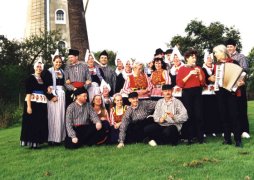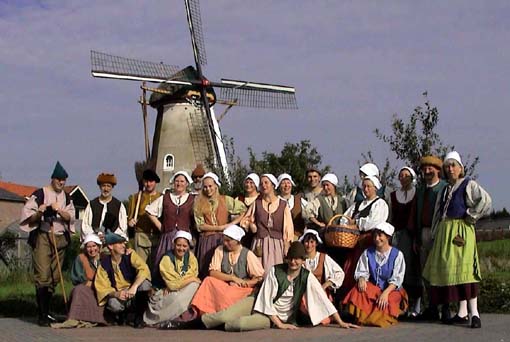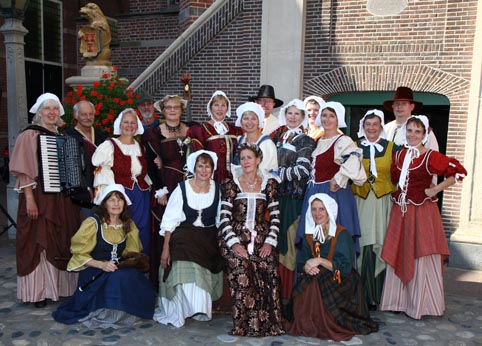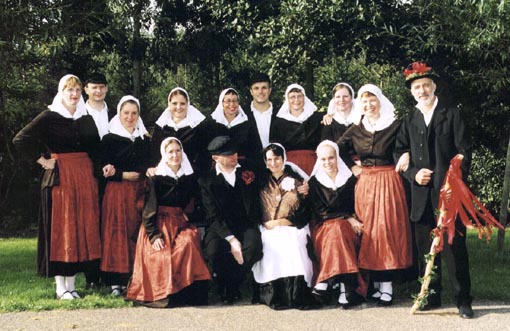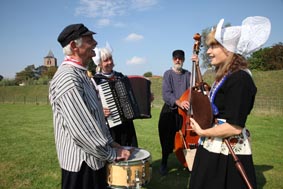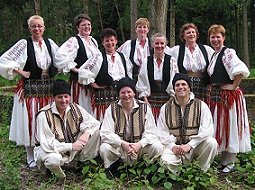Repertoire
Oriënt performs all over the Netherlands, but also in other European countries. Abroad they mainly show dances from the Netherlands.
The colourful costumes Oriënt wears are handmade by traditional examples.
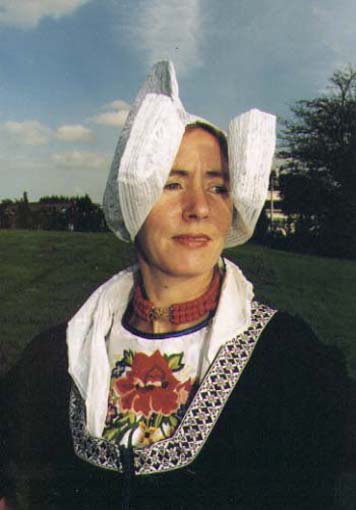
Performing time: possible in 5 - 10 - 15 or 20 minutes
This most popular series of dances is a mix of old Dutch dances with costumes from Volendam and Marken. These are old fishing villages situated north from Amsterdam. Men dance with women from both villages and you will see how love and jealousy can strike.
Click on picture to see more
Performing time: 15 min (also possible to dance a part in 5 or 10 minutes)
This is a choreography from the south of the Netherlands; the province of Brabant. You will see how the people lived in the times of Breughel. He was a famous painter from Flanders in the 16e century. The series begins with a tableau vivant( 'a living painting'). For people who don't understand the Dutch language, it is not difficult to understand what the dance is about. You will see how fabrics are woven, how the men worked and how the women washed and ironed the laundry.
Click on picture to see more
This dance carries you back to 17th and 18th century Europe:
- to the upper class of European society, where noblemen with their ladies, dressed in flamboyant costumes, danced genteelly around at the various court balls.
- to the lower classes of society, often the aristocrats’ servants, who made fun of the strict rules at these upper-class court balls and developed their own dances. These dances were obviously not performed at the official balls.
In this dance you will see part of an official ball dance combined with a lively and gay lower-class dance, rounding off with a stately Minuet.
Click on picture to see more
Performing time: 13 minutes ( not possible in 5 or 10 minutes)
This choreography is a series of traditional bridal dances from an area called 'De Achterhoek'. In this series the celebrating of a wedding and what happened before the wedding to bring the couple together, are most important. Easy to recognise are the 'aanzegger' (a friend of the bride and groom, who invites the guests with a decorated cane), the presenting of a tea-pot (a traditional wedding gift) and the performing of a ritual with a ribbon by the wedding guests, to express the bonding that marriage stands for.
Click on picture to see more
Folk band Vranje:
When Oriënt performs on large festivals or abroad, the folk band Vranje comes along to provide live music. This results in a very nice interaction between the dancers and the musicians, which makes the performances even more dynamic and cheerful. Vranje consists of Els Horsman (accordion), Hans Koerts Meijer (drums and singing), Jan Verheijen (stringbass) and Jannie Schermer (clarinet, flute and singing). This band plays a wide selection of traditional folk music and has accompanied many dance groups from the Netherlands at various festivals in several Europian countries.
Click on picture to see more
International repertoire:
Choreography: Petra and Hein van Koelen
Banat suite: A series of dances from the region Banat in Serbia.
In the first dance of the series a young girl receives a letter with the message that her beloved one is missing.
Fortunately this proves to be a mistake and the dance that started a little sad, finishes in a merry mood.
The other dances of the series are inspired on authentic choreographies from Rumania.
They form a series in which the spinning of the girls ensure a twirling show for the eyes.
Click on picture to see more
Choreography: Gustáv Balázs and Petra Koelen
The series start with a Verbunk, a recruiting dance for the army, with many clapping figures danced by the men, followed by a Chárdás, a dance for pairs in which the men make the girls spin around a lot. The series conclude with a Karikázo, a girls' dance in which the singing and the stamping are important, as well as the spinning round of the wide skirts with underneath the starched waist slips.
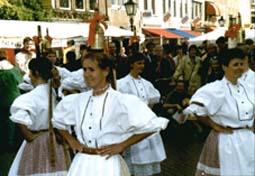
Click on picture to see more
